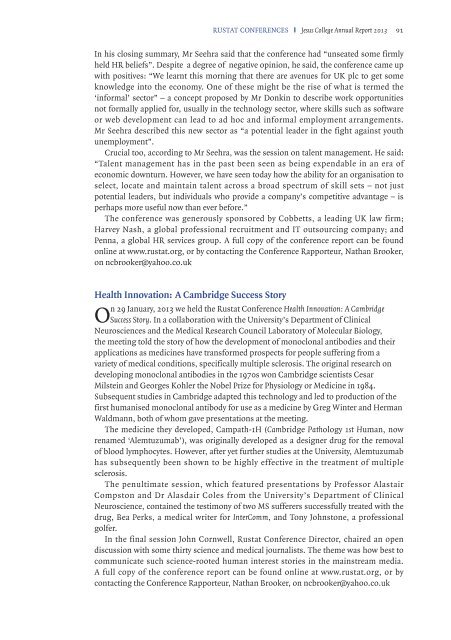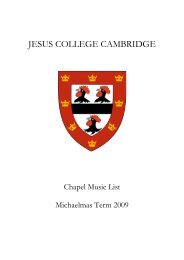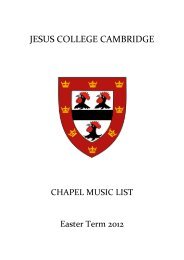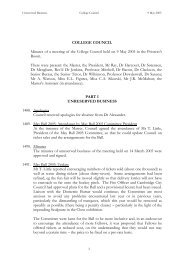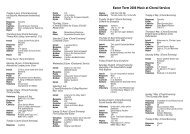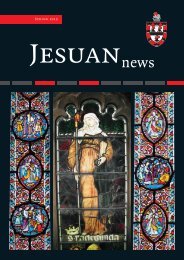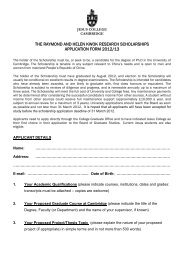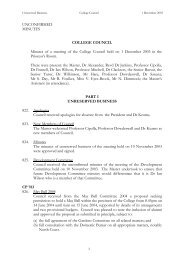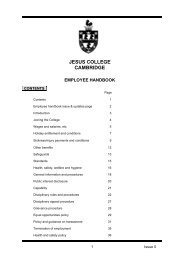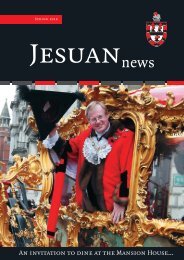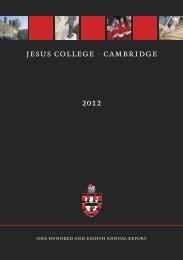2013 Annual Report - Jesus College - University of Cambridge
2013 Annual Report - Jesus College - University of Cambridge
2013 Annual Report - Jesus College - University of Cambridge
You also want an ePaper? Increase the reach of your titles
YUMPU automatically turns print PDFs into web optimized ePapers that Google loves.
RUSTAT CONFERENCES I <strong>Jesus</strong> <strong>College</strong> <strong>Annual</strong> <strong>Report</strong> <strong>2013</strong> 91<br />
In his closing summary, Mr Seehra said that the conference had “unseated some firmly<br />
held HR beliefs”. Despite a degree <strong>of</strong> negative opinion, he said, the conference came up<br />
with positives: “We learnt this morning that there are avenues for UK plc to get some<br />
knowledge into the economy. One <strong>of</strong> these might be the rise <strong>of</strong> what is termed the<br />
‘informal’ sector” – a concept proposed by Mr Donkin to describe work opportunities<br />
not formally applied for, usually in the technology sector, where skills such as s<strong>of</strong>tware<br />
or web development can lead to ad hoc and informal employment arrangements.<br />
Mr Seehra described this new sector as “a potential leader in the fight against youth<br />
unemployment”.<br />
Crucial too, according to Mr Seehra, was the session on talent management. He said:<br />
“Talent management has in the past been seen as being expendable in an era <strong>of</strong><br />
economic downturn. However, we have seen today how the ability for an organisation to<br />
select, locate and maintain talent across a broad spectrum <strong>of</strong> skill sets – not just<br />
potential leaders, but individuals who provide a company’s competitive advantage – is<br />
perhaps more useful now than ever before.”<br />
The conference was generously sponsored by Cobbetts, a leading UK law firm;<br />
Harvey Nash, a global pr<strong>of</strong>essional recruitment and IT outsourcing company; and<br />
Penna, a global HR services group. A full copy <strong>of</strong> the conference report can be found<br />
online at www.rustat.org, or by contacting the Conference Rapporteur, Nathan Brooker,<br />
on ncbrooker@yahoo.co.uk<br />
Health Innovation: A <strong>Cambridge</strong> Success Story<br />
On 29 January, <strong>2013</strong> we held the Rustat Conference Health Innovation: A <strong>Cambridge</strong><br />
Success Story. In a collaboration with the <strong>University</strong>’s Department <strong>of</strong> Clinical<br />
Neurosciences and the Medical Research Council Laboratory <strong>of</strong> Molecular Biology,<br />
the meeting told the story <strong>of</strong> how the development <strong>of</strong> monoclonal antibodies and their<br />
applications as medicines have transformed prospects for people suffering from a<br />
variety <strong>of</strong> medical conditions, specifically multiple sclerosis. The original research on<br />
developing monoclonal antibodies in the 1970s won <strong>Cambridge</strong> scientists Cesar<br />
Milstein and Georges Kohler the Nobel Prize for Physiology or Medicine in 1984.<br />
Subsequent studies in <strong>Cambridge</strong> adapted this technology and led to production <strong>of</strong> the<br />
first humanised monoclonal antibody for use as a medicine by Greg Winter and Herman<br />
Waldmann, both <strong>of</strong> whom gave presentations at the meeting.<br />
The medicine they developed, Campath-1H (<strong>Cambridge</strong> Pathology 1st Human, now<br />
renamed ‘Alemtuzumab’), was originally developed as a designer drug for the removal<br />
<strong>of</strong> blood lymphocytes. However, after yet further studies at the <strong>University</strong>, Alemtuzumab<br />
has subsequently been shown to be highly effective in the treatment <strong>of</strong> multiple<br />
sclerosis.<br />
The penultimate session, which featured presentations by Pr<strong>of</strong>essor Alastair<br />
Compston and Dr Alasdair Coles from the <strong>University</strong>’s Department <strong>of</strong> Clinical<br />
Neuroscience, contained the testimony <strong>of</strong> two MS sufferers successfully treated with the<br />
drug, Bea Perks, a medical writer for InterComm, and Tony Johnstone, a pr<strong>of</strong>essional<br />
golfer.<br />
In the final session John Cornwell, Rustat Conference Director, chaired an open<br />
discussion with some thirty science and medical journalists. The theme was how best to<br />
communicate such science-rooted human interest stories in the mainstream media.<br />
A full copy <strong>of</strong> the conference report can be found online at www.rustat.org, or by<br />
contacting the Conference Rapporteur, Nathan Brooker, on ncbrooker@yahoo.co.uk


